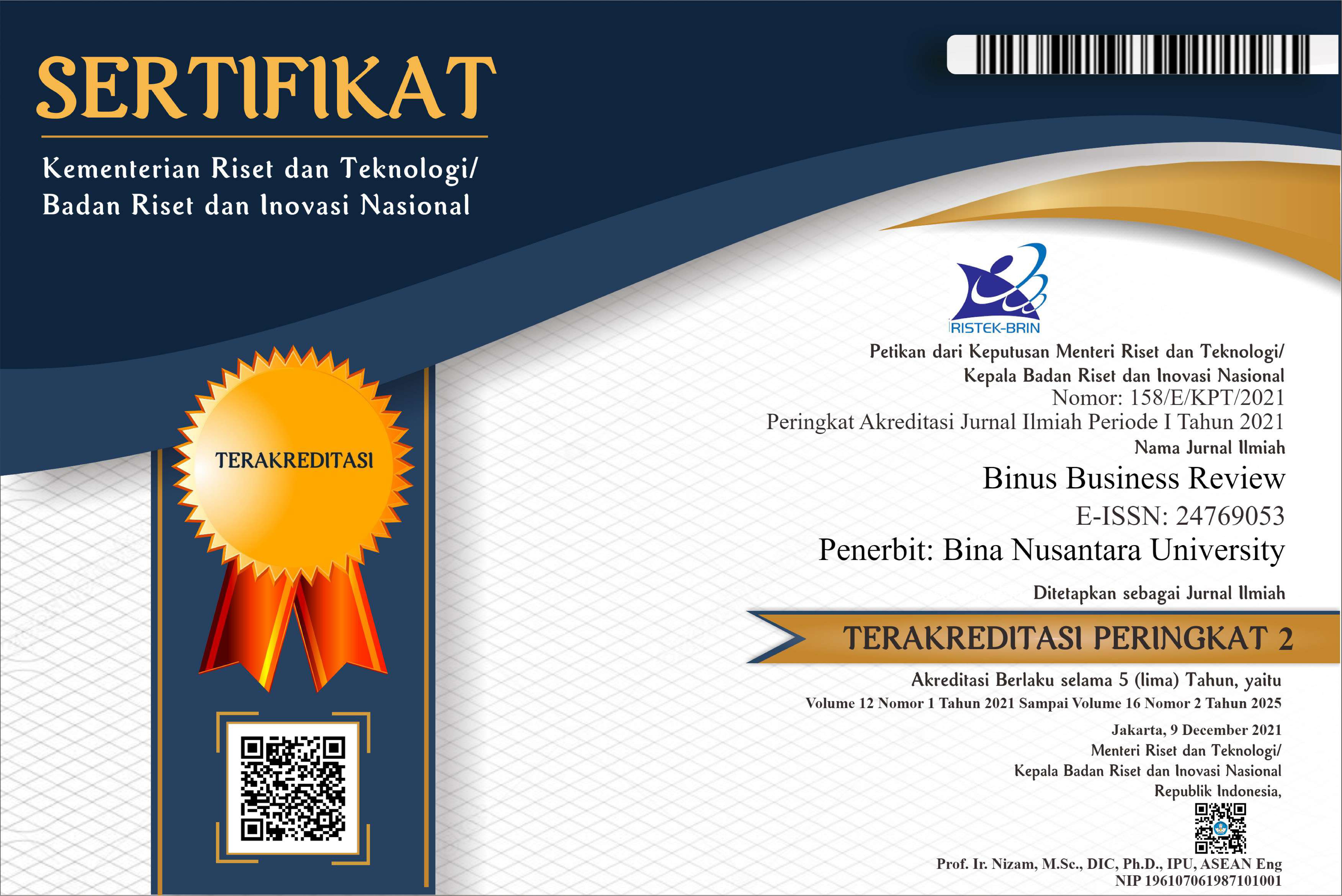Affective Commitment to Organizations: A Comparison Study of Reverse Mentoring Versus Traditional Mentoring Among Millennials
DOI:
https://doi.org/10.21512/bbr.v8i2.3666Keywords:
Mentoring, Millennials, Affective Commitment, Leader-Member ExchangeAbstract
A current topic of interest in management and organization research is the phenomenon of a generation shift in the workforce and how this shift will affect organizations in the near future. Millennials represent the largest generational cohort in the American workforce. Organizations find themselves challenged with retention efforts as Millennials tend to leave an organization after short tenures. The problem this study addressed is the high turnover rates among millennial employees. Specifically, it was unknown whether Millennials who received reverse mentoring evidenced greater affective commitment to the organization as compared to Millennials who received standard mentoring. The purpose of this study was to investigate the hypothesis that Millennials who received reverse mentoring evidenced greater affective commitment to the organization as compared to Millennials who received standard mentoring. A two group post-test only quasi-experimental design was conducted. A total of 90 participants (45 per group) completed the survey. The survey was conducted by Qualtrics, an online survey company. The sample population included male and female individuals, born between 1982 and 1998, employed by all types of organizations in the United States and participating in a mentoring program at the time the survey was taken. Affective commitment was greater in the reverse mentoring group (M = 36.683, SE = .959) compared to the traditional mentoring group (M = 34.984, SE = .959). However, after adjustment for quality of relationship (LMX) and length and frequency of mentoring (LFM) there was no statistically significant difference (p < .05) between traditional mentoring and reverse mentoring on affective commitment to the organization indicated by F(1,86) = 1.569, p = .214. Additional results of this study showed that two-thirds of the surveyed millennial employees had already exceeded the average length of employment of 12 to 18 months with the organization they were employed with at the time of the survey. This finding indicated the importance of investing in workplace relationships, such as mentoring, regardless of traditional or reverse.Plum Analytics
References
Ahmed, I., Ismail, W. K., Amin, S. M., & Ramzan, M. (2013). Influence of relationship of POS, LMX and organizational commitment on turnover intentions. Organization Development Journal, 31(1), 55-68. Retrieved from http://www.researchgate.net/profile/Scott_Allen5/publication/263580624_Organization_Development_Journal/links/0046353b461747567d000000.pdf#page=55
Aruna, M., & Anitha, J. (2015). Employee retention enablers: Generation Y employees. SCMC Journal of Indian Management, 12(3), 94-103. Retrieved from www.scms.edu.in/jim/SCMS Journal July-Sep 2015.pdf
Bitektine, A., & Miller, D. (2015). Methods, theories, data, and the social dynamics of organizational research. Journal of Management Inquiry, 24(2), 115-130. doi:10.1177/1056492614546897
Blatter, M., Muehlmann, S., & Schenker, S. (2012). The costs of hiring skilled workers. European Economic Review, 56, 20-35. doi:10.1016/j.euroecorev.2011.08.001
Cahill, T. F., & Sedrak, M. (2012). Leading a multigenerational workforce: Strategies for attracting and retaining millennials. Frontiers of Health Services Management, 29(1), pp. 3-15. Retrieved from http://www.ncbi.nlm.nih.gov/pubmed/23050333
Cogin, J. (2012). Are generational differences in work values fact or fiction? Multi-country evidence and implications. The International Journal of Human Resource Management, 23(11), 2268-2294. doi:10.1080/09585192.2011.610967
Craig, C. A., Allen, M. W., Reid, M. F., Riemenschneider, C. K., & Armstrong, D. J. (2012). The impact of career mentoring and psychosocial mentoring on affective organizational commitment, job involvement, and turnover intention. Journal of Administration & Society, 45(8), 949-973. doi:10.1177/0095399712451885
Dye, D., & Lapter, A. (2013). The looming retirement and attrition wave: Are you prepared for the ride? Journal of Government Financial Management, 62(4), 26-32. Retrieved from http://www.agacgfm.org/100446455
Ertas, N. (2015). Turnover intentions and work motivations of millennial employees in federal service. Public Personnel Management, 44(3), 401-423. doi:10.1177/0091026015588193
Fry, R. (2015). Millennials surpass gen Xers as the largest generation in U. S. labor force. Retrieved from Pew Research Center: http://www.pewresearch.org/fact-tank/2015/05/11/millennials-surpass-gen-xers-as-the-largest-generation-in-u-s-labor-force/
Gosh, P., & Sayyawadi, R. (2013). Who stays with you? Factors predicting employees' intention to stay. International Journal of Organizational Analysis, 21(3), 288-312. doi:10.1108/IJOA-Sep-2011-0511
Graen, G. B., & Schiemann, W. A. (2013). Leadership-motivated excellence theory: an extension of LMX. Journal of Managerial Psychology, 28(5), 452-469. doi:10.1108/JMP-11-2012-0351
Graen, G. B., & Uhl-Bien, M. (1995). Relationship-based approach to leadership: Development of leader-member exchange (LMX) theory of leadership over 25 years: Applying a multi-level multi-domain perspective. The Leadership Quarterly, 6(2), 219-247. doi:10.101611048-9843(95)90036-5
Gursoy, D., Chi, C., & Karadag, E. (2013). Generational differences in work values and attitudes among frontline and service contract employees. International Journal of Hospitality Management, 32, 40-48. doi:10.1016/j.ijhm.2012.04.002
Haggard, D. L. (2012). Mentoring and psychological contract breach. Journal of Business and Psychology, 27(2), 161-175. doi:10.1007/s10869-011-9237-2
Hamati-Ataya, I. (2012). Beyone (post) positivism: The missed promises of systemci pragmatism. International Studies Quarterly, 56(2), 291-305. doi:10.1111/j.1468-2478.2011.00710.x
Kaifi, B. A., Nafei, W. A., Khanfar, N. M., & Kaifi, M. M. (2012). A multi-generational workforce: Managing and understanding millenials. International Journal of Business and Management, 7(24), 88-93. doi:10.5539/ijbm.v7n24p88
Meyer, J. P., & Allen, N. J. (1991). A three-component conceptualization of organizational commitment. Human Resource Management Review, 1(1), 68-89. doi:10.10161/1053-4822(19)90011-Z
Murphy, W. M. (2012). Reverse mentoring at work: Fostering cross-generational learning and developing millenial leaders. Human Resource Management, 51(4), 549-574. doi:10.1002/hrm.21489
Nolan, L. S. (2015). The roar of the millennials: Retaining top talent in the workplace. Journal of Leadership, Accountability and Ethics, 12(5), 69-75. Retrieved from www.na-businesspress.com/jabeopen/NolanWeb.pdf
Payne, S. C., & Huffman, A. H. (2005). A longitudinal examination of the influence of mentoring on organizational commitment and turnover. Academy of Management Journal, 48(1), 158-168. doi:10.5465/amj.2005.1599.3166
Roodin, P., & Mendelson, M. (2013). Multiple generations at work: Current and future trends. Journal of Intergenerational Relationships, 11(3), 213-222. doi:10.1080/15350770.2013.810496
Ropes, D. (2013). Intergenerational learning in organizations. European Journal of Training and Development, 37(8), 713-727. doi:10.1108/EJTD-11-2012-0081
Schwabel, D. (2013). The cost of Millennial retention study. Retrieved from Millennial Branding: millennialbranding.com/2013/cost-millennial-retention-study/
Sherman, J. D. (2002). Leader role inversion as a corollary to leader-member exchange. Group & Organization Management, 27(2), 254-271. doi:10.1177/10501102027002005
Sun, L. Y., Pan, W., & Chow, I. H. (2014). The role of supervisor political skill in mentoring: Dual motivational perspectives. Journal of Organizational Behavior, 35, 213-233. doi:10.1002/job.1865
United States Census Bureau. (2014). Employee tenure in 2014. Retrieved from www.bls.gov/news.release/pdf/tenure.pdf
United States Census Bureau. (2015). Millennials outnumber baby boomers and are far more diverse. Retrieved from http://www.census.gov/newsroom/press-releases/2015/cb15-113.html
Walumbwa, F. O., Cropanzano, R., & Goldman, B. M. (2011). How leader-member exchange influences effective work behaviors: Social exchange and internal-external efficacy perspectives. Personnel Psychology, 64, 739-770. doi:10.1111/j.1744-6570.2011.01224.x
Downloads
Published
Issue
Section
License
Copyright (c) 2017 Catrin Hechl

This work is licensed under a Creative Commons Attribution-ShareAlike 4.0 International License.
Authors who publish with this journal agree to the following terms:
a. Authors retain copyright and grant the journal right of first publication with the work simultaneously licensed under a Creative Commons Attribution License - Share Alike that allows others to share the work with an acknowledgment of the work's authorship and initial publication in this journal.
b. Authors are able to enter into separate, additional contractual arrangements for the non-exclusive distribution of the journal's published version of the work (e.g., post it to an institutional repository or publish it in a book), with an acknowledgment of its initial publication in this journal.
c. Authors are permitted and encouraged to post their work online (e.g., in institutional repositories or on their website) prior to and during the submission process, as it can lead to productive exchanges, as well as earlier and greater citation of published work.
USER RIGHTS
All articles published Open Access will be immediately and permanently free for everyone to read and download. We are continuously working with our author communities to select the best choice of license options, currently being defined for this journal as follows: Creative Commons Attribution-Share Alike (CC BY-SA)




















